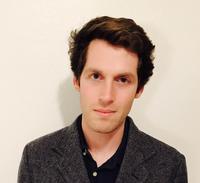
Ph.D., University of California, Berkeley, 2016
A.B., Harvard College, 2007
urban, cultural, and historical geography; landscape studies; American and transnational intellectual histories of planning and urbanism; urban, suburban, and regional form; social and geographic thought; histories of knowledge, science, and expertise; materiality and material culture; temporality and historiography; ruins and ruination
E-mail: psrekman@berkeley.edu
Website: psre.us
Peter Ekman is a cultural and historical geographer of urban America. At Berkeley, he has offered four courses: "American Landscapes: History, Geography, and the Built Environment since 1500" (Geography 160), "Walkers in the City: Landscape, Mobility, and Everyday Life" (Geography 170), "Field Study of Buildings and Cities: A New Exploration of the Bay Region" (Geography 182), and "Regions, Peoples, States: On Geographic Inquiry" (Geography 10). He has also taught in the Department of Geography, Environment, and Planning at Sonoma State University, and in the Community Studies Program at the University of California, Santa Cruz. His teaching joins an attention to the materiality of vernacular and designed landscapes (buildings, infrastructures, open spaces, etc.) with a consuming interest in the history of ideas, lay and expert, about how best to study, theorize, visualize, write about, govern, and intervene on those landscapes.
In his postdoctoral work, he has been a Clarence S. Stein Fellow at the Clarence S. Stein Institute for Urban and Landscape Studies, in Cornell University's Department of City and Regional Planning; a Mellon Fellow in Urban Landscape Studies at Harvard University's Dumbarton Oaks Research Library and Collection in Washington, D.C..; a Mauk and Nunis Fellow at the Huntington Library; and a McColl Fellow at the American Geographical Society Library in Milwaukee, Wisconsin. He is completing his first book manuscript, a hemispheric intellectual and political history of postwar urbanism that poses a series of questions about the temporality of what it is to plan the urban future on the basis of knowledge about the past. It reconstructs the intellectual network that codified what at the middle of the twentieth century was called "organized research" on urban life, and it traces the emergence of "urban studies" as a new, composite form of expertise, one that arose as geography departments were beginning to disappear from elite universities in the United States. The book draws on material from several cities but is localized mainly on this country's Eastern Seaboard, as well as in South America and, to some extent, Western Europe. A second, longer-term book project expands on his dissertation, a study in the material culture of industrial, deindustrialized, and otherwise non-elite suburbs on the eastern fringes of the San Francisco Bay Area.
JOURNAL ARTICLES
2021. “From Prophecy to Projection: The New York Metropolitan Region Study and the Rescaling of the Urban Future, 1956–1968,” Planning Perspectives 36(1): 147–182.
2020. “‘This Scene Is Itself Living’: Buildings as Landscapes in Transatlantic Human Geography, 1870–1970,” History of the Human Sciences 34 (forthcoming in print; published online).
2016. “Diagnosing Suburban Ruin: A Prehistory of Mumford’s Postwar Jeremiad,” Journal of Planning History 15(2): 108–128.
2015. “‘A Town Should Be Built to Make the Whole Thing Work’: Modeling Patterson, City Beautiful of California’s Central Valley,” Journal of Urban History 41(3): 460–478.
CHAPTERS IN EDITED VOLUMES
2021. “Human Geography and the Ecologies of Dwelling,” in Landscapes of Housing: Design and Planning in the History of Environmental Thought, ed. Jeanne Haffner (Routledge, forthcoming).
BOOK REVIEWS
2020. Garage, by Olivia Erlanger and Luis Ortega Govela, in Buildings and Landscapes 27(2): 112–115.
2019. The Sociable City: An American Intellectual Tradition, by Jamin Creed Rowan, in Historical Geography 46: 345–348.
2015. Refrains for Moving Bodies: Experience and Experiment in Affective Spaces, by Derek P. McCormack, in Social & Cultural Geography 16: 998–999.
2014. Civitas by Design: Building Better Communities from the Garden City to the New Urbanism, by Howard Gillette, Jr., in Urban Geography 35: 1105–1106.
2014. Little White Houses: How the Postwar Home Constructed Race in America, by Dianne Harris, in Cultural Geographies 21: 167–168.
2013. Building a Market: The Rise of the Home Improvement Industry, 1914–1960, by Richard Harris, in Historical Geography 41: 198–200.
PUBLIC SCHOLARSHIP
2021. “Projecting ‘Spread City’: The New York Metropolitan Study and Its Critics," in Gotham: A Blog for Scholars of New York City History.
2020. “‘Radburn Rackets’: Robert D. Kohn and Marjorie Sewell Cautley's Sketches Against the Speculative Suburb,” in PLATFORM.
BOOK MANUSCRIPT
Timing the Future Metropolis: Planning, Knowledge, and Disavowal in America's Postwar Urbanism (in progress).
